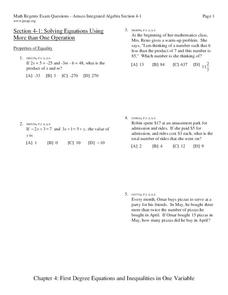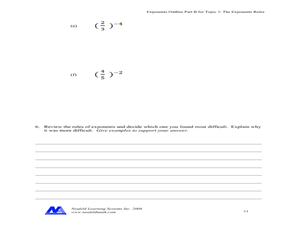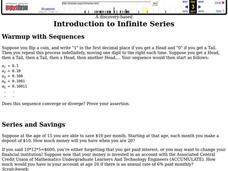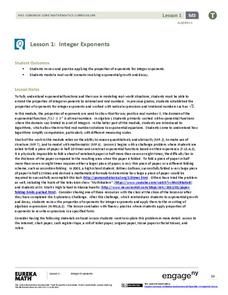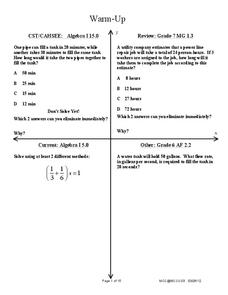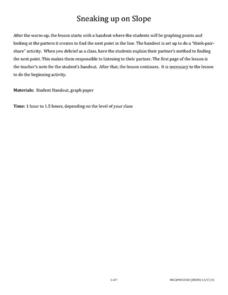Curated OER
Trigonometric Expressions and Identities
In this college level Pre-calculus worksheet, students use the trigonometric identities to factor and simplify trigonometric expressions. Students use algebra to prove various trigonometric identities. The three page...
Curated OER
Solving Equations Using More than One Operation
In this algebra worksheet, students solve equations using addition, subtraction, multiplication and division. They solve word problems using equations. There are 5 questions with an answer key.
Curated OER
Empirical Probability
In this algebra worksheet, students identify the probability of something happening. They use empirical probability to solve problems. There are 5 questions with an answer key.
Curated OER
Airport Problem
In this algebra worksheet, students are given a word problem to solve using algebraic symbols. They find a path of an airplane without the airplane retracing its path. An answer with a full explanation is included.
Curated OER
The Sequences Problem
In this Algebra I/Geometry/Algebra II worksheet, students determine what term is missing in the two given sequences. The one page worksheet has two problems with the solutions.
Curated OER
Answer to May 31 Word Problem
In this algebra worksheet, students use algebraic expression to rewrite word problems and solve the equations. There are 4 expanded questions on this worksheet.
Curated OER
Linear Systems: Least Squares Approximations
In this least squares approximation worksheet, learners use linear algebra to find the least square error and the equation of a line for given points. They find the equation of a parabola through provided points. This four-page...
Curated OER
The Exponent Rules
In this Algebra I worksheet, 9th graders use the computer program Understanding Exponents to examine the laws of exponents. The worksheet is divided into an on computer and off computer component. The worksheet is eleven...
Curated OER
Mr. P's ShoppingTrip
In this shopping trip worksheet, students read given facts and determine amount of money in hand prior to a shopping trip. This one-page worksheet contains 1 multi-step problem using logic and algebraic reasoning. The answer...
Curated OER
Introduction to Infinite Series
In this algebra worksheet, students find the pattern and nth formula for different series. They decide whether a sequence will diverge or converge. There are 13 questions.
Curated OER
Order of Operations
In this order of operations worksheet, students solve and complete 7 different problems that include using the order of operations or PEMDAS. First, they simplify expressions inside grouping symbols and then any terms containing...
Federal Reserve Bank
Cash Flow and Balance Sheets
What is your car worth? How much do you owe? Individuals create their personal cash flow and balance sheets. They learn the difference between an asset and liability using their personal information to complete the activity.
National Security Agency
A Balancing Act: Solving Multi-Step Equations
Wow! Put on that thinking cap and solve multi-step equations. To solve equations, learners review the use of the distributive property and combining like terms. This three-day lesson comes with about 20 pages of worksheets, warm-ups,...
Curated OER
Spelling List 13: Sight Words, "ure" Pattern, and Academic Vocabulary
In this spelling worksheet, learners practice their spelling words that include sight words, ure pattern, and vocabulary. Students practice spelling 21 words.
EngageNY
Summarizing Bivariate Categorical Data with Relative Frequencies
It is hard to determine whether there is a relationship with the categorical data, because the numbers are so different. Working with a familiar two-way table on super powers, the class determines relative frequencies for each...
EngageNY
Modeling from a Sequence
Building upon previous knowledge of sequences, collaborative pairs analyze sequences to determine the type and to make predictions of future terms. The exercises build through arithmetic and geometric sequences before introducing...
EngageNY
Integer Exponents
Fold, fold, and fold some more. In the first installment of a 35-part module, young mathematicians fold a piece of paper in half until it can not be folded any more. They use the results of this activity to develop functions for the area...
EngageNY
Relationships Between Two Numerical Variables
Is there another way to view whether the data is linear or not? Class members work alone and in pairs to create scatter plots in order to determine whether there is a linear pattern or not. The exit ticket provides a quick way to...
EngageNY
Relationships Between Two Numerical Variables
Working in small groups and in pairs, classmates build an understanding of what types of relationships can be used to model individual scatter plots. The nonlinear scatter plots in this lesson on relationships between two numerical...
EngageNY
Modeling a Context from a Verbal Description (part 2)
I got a different answer, are they both correct? While working through modeling problems interpreting graphs, the question of precision is brought into the discussion. Problems are presented in which a precise answer is needed and...
EngageNY
The “WhatPower” Function
The Function That Shall Not Be Named? The eighth installment of a 35-part module uses a WhatPower function to introduce scholars to the concept of a logarithmic function without actually naming the function. Once pupils are...
West Contra Costa Unified School District
Work Problems – Bar Models
Why do we have to do so much work? Scholars learn how to set up bar models to represent a situation involving work. They use these bar models to help set up equations with rational coefficients to solve the problem situation.
West Contra Costa Unified School District
Solving and Using Literal Equations
You literally need to use the resource. Young mathematicians solve geometric problems by using literal equations. They go on to solve distance/rate/time problems by using literal equations — a great progression that helps introduce the...
West Contra Costa Unified School District
Sneaking Up on Slope
Pupils determine the pattern in collinear points in order to determine the next point in a sequence. Using the definition of slope, they practice using the slope formula, and finish the activity with three different ways to...
Other popular searches
- Beginning Algebra Worksheets
- Beginning Algebra Patterns
- 5th Grade Beginning Algebra
- Beginning Algebra Fractions
- Beginning Algebra +Patterns
- Beginning Algebra Marathi
- Beginning Algebra in Marathi
- Beginning Algebra Lessons
- Beginning Algebra %2Patterns
- Beginning Algebra Equations
- Beginning Algebraic Patterns
- Algebra, Beginning



